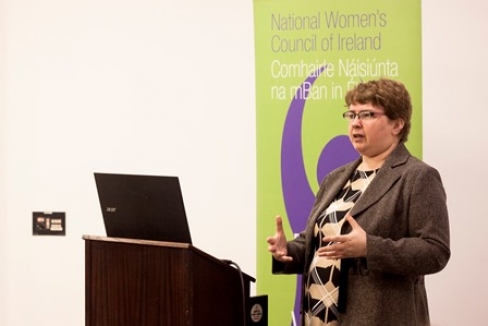Gender proofing our healthcare system will improve health outcomes for all patients
Published: Wednesday, April 27, 2016

Over the coming months Ireland will be examined by the UN under the Convention on the Elimination of All Forms of Discrimination against Women (CEDAW) and will be required to report on how it promotes women’s right to health.
Against this backdrop the National Women’s Council of Ireland (NWCI) hosted an expert seminar today on Advancing gender equality in healthcare: The potential of the public sector duty to promote equality and human rights.
Speakers included Emily Logan, Chief Commissioner, Irish Human Rights and Equality Commission and Dr Noeleen Shields, Corporate Inequalities Team, NHS Scotland.
Orla O’Connor, Director, NWCI said,
“We know that women and men have different health needs and therefore need a healthcare system that recognises these differences in order to ensure best outcomes for patients. But to make this happen and fulfil Ireland’s international human rights obligations we need leadership and senior level commitment from across the health service to make gender proofing of health services a priority. We also need a co-ordinated response to embedding gender equality into HSE services. NWCI therefore calls for the establishment of a gender mainstreaming unit within the Department of Health or the HSE to guide all efforts.”
Emily Logan, Chief Commissioner, Irish Human Rights and Equality Commission said,
“The new public sector duty has the potential to reduce inequalities and advance the realisation of human rights in the provision of key services, particularly in health service provision. It can also promote cultural change in the public sector.”
Noreen Shields, NHS Scotland said,
“Persistent health inequalities exist in Scotland linked to deprivation, age, gender and ethnicity. Recognising gender as a key determinant of health is crucial for better access to health services and better health outcomes for women and men. In Scotland a ministerial taskforce on inequalities has tackled the issue head on by identifying priorities such as violence against women, women in employment and the need for a strong infrastructure in the NHS to tackle gender inequality. This co-ordinated approach has produced visible tangible results for a diversity of women and men. To achieve gender equality in health, health services must take a structured approach by gender proofing plans and services and providing dedicated resources.”
The event also heard about the results from two gender equality projects. Joanne Vance from the Irish Cancer Society highlighted the positive outcomes for women who participated in the “We Can Quit” smoking cessation programme.
Frances Swaray talked about how they made the Longford Primary Care Project for Travellers more accessible for men.
Speakers also included Dr. Cate Hartigan, Assistant National Director, Health & Wellbeing Division, HSE.
Ends/
For more information, please contact Silke Paasche, NWCI, silkep@nwci.ie or Tel. 085 858 9104.
